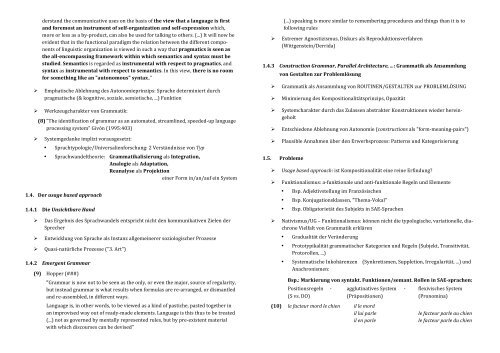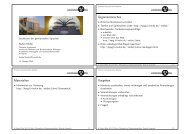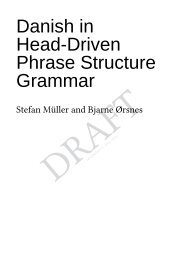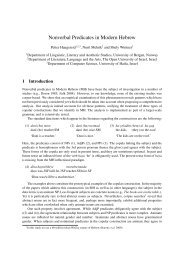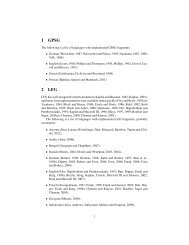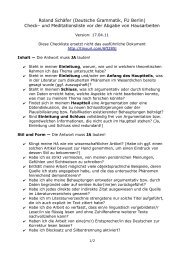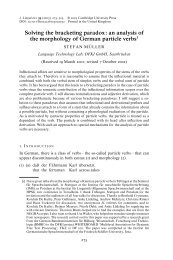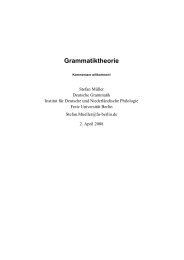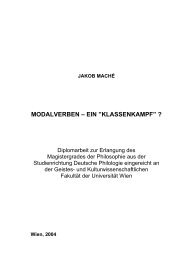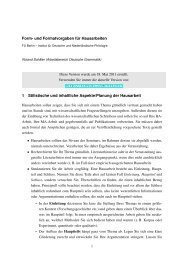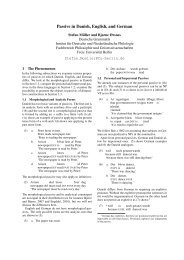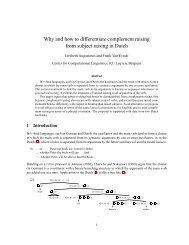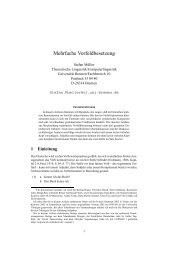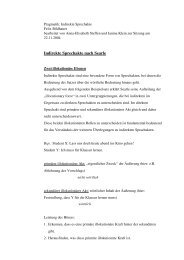Handout - German Grammar Group FU Berlin
Handout - German Grammar Group FU Berlin
Handout - German Grammar Group FU Berlin
Sie wollen auch ein ePaper? Erhöhen Sie die Reichweite Ihrer Titel.
YUMPU macht aus Druck-PDFs automatisch weboptimierte ePaper, die Google liebt.
derstand the communicative uses on the basis of the view that a language is first<br />
and foremost an instrument of self-‐organization and self-‐expression which,<br />
more or less as a by-‐product, can also be used for talking to others. (...) It will now be<br />
evident that in the functional paradigm the relation between the different compo-‐<br />
nents of linguistic organization is viewed in such a way that pragmatics is seen as<br />
the all-‐encompassing framework within which semantics and syntax must be<br />
studied. Semantics is regarded as instrumental with respect to pragmatics, and<br />
syntax as instrumental with respect to semantics. In this view, there is no room<br />
for something like an "autonomous" syntax.."<br />
Emphatische Ablehnung des Autonomieprinzips: Sprache determiniert durch<br />
pragmatische (& kognitive, soziale, semiotische, ...) Funktion<br />
Werkzeugcharakter von Grammatik:<br />
(8) "The identification of grammar as an automated, streamlined, speeded-‐up language<br />
processing system" Givón (1995:403)<br />
Systemgedanke implizt vorausgesetzt:<br />
• Sprachtypologie/Universalienforschung: 2 Verständnisse von Typ<br />
• Sprachwandeltheorie: Grammatikalisierung als Integration,<br />
Analogie als Adaptation,<br />
Reanalyse als Projektion<br />
einer Form in/an/auf ein System<br />
1.4. Der usage based approach<br />
1.4.1 Die Unsichtbare Hand<br />
Das Ergebnis des Sprachwandels entspricht nicht den kommunikativen Zielen der<br />
Sprecher<br />
Entwicklung von Sprache als Instanz allgemeinerer soziologischer Prozesse<br />
Quasi-‐natürliche Prozesse ("3. Art")<br />
1.4.2 Emergent <strong>Grammar</strong><br />
(9) Hopper (###)<br />
"<strong>Grammar</strong> is now not to be seen as the only, or even the major, source of regularity,<br />
but instead grammar is what results when formulas are re-‐arranged, or dismantled<br />
and re-‐assembled, in different ways.<br />
Language is, in other words, to be viewed as a kind of pastiche, pasted together in<br />
an improvised way out of ready-‐made elements. Language is this thus to be treated<br />
(...) not as governed by mentally represented rules, but by pre-‐existent material<br />
with which discourses can be devised"<br />
(...) speaking is more similar to remembering procedures and things than it is to<br />
following rules<br />
Extremer Agnostizismus, Diskurs als Reproduktionsverfahren<br />
(Wittgenstein/Derrida)<br />
1.4.3 Construction <strong>Grammar</strong>, Parallel Architecture, ...: Grammatik als Ansammlung<br />
von Gestalten zur Problemlösung<br />
Grammatik als Ansammlung von ROUTINEN/GESTALTEN zur PROBLEMLÖSUNG<br />
Minimierung des Kompositionalitätsprinzips, Opazität<br />
Systemcharakter durch das Zulassen abstrakter Konstruktionen wieder herein-‐<br />
geholt<br />
Entschiedene Ablehnung von Autonomie (constructions als "form-‐meaning-‐pairs")<br />
Plausible Annahmen über den Erwerbsprozess: Patterns und Kategorisierung<br />
1.5. Probleme<br />
Usage based approach: ist Kompositionalität eine reine Erfindung?<br />
Funktionalismus: a-‐funktionale und anti-‐funktionale Regeln und Elemente<br />
• Bsp. Adjektivstellung im Französischen<br />
• Bsp. Konjugationsklassen, "Thema-‐Vokal"<br />
• Bsp. Obligatorietät des Subjekts in SAE-‐Sprachen<br />
Nativismus/UG – Funktionalismus: können nicht die typologische, variationelle, dia-‐<br />
chrone Vielfalt von Grammatik erklären<br />
• Gradualität der Veränderung<br />
• Prototypikalität grammatischer Kategorien und Regeln (Subjekt, Transitivität,<br />
Protorollen, ...)<br />
• Systematische Inkohärenzen (Synkretismen, Suppletion, Irregularität, ...) und<br />
Anachronismen:<br />
Bsp.: Markierung von syntakt. Funktionen/semant. Rollen in SAE-‐sprachen:<br />
Positionsregeln -‐ agglutinatives System -‐ flexivisches System<br />
(S vs. DO) (Präpositionen) (Pronomina)<br />
(10) le facteur mord le chien il le mord<br />
il lui parle le facteur parle au chien<br />
il en parle le facteur parle du chien


